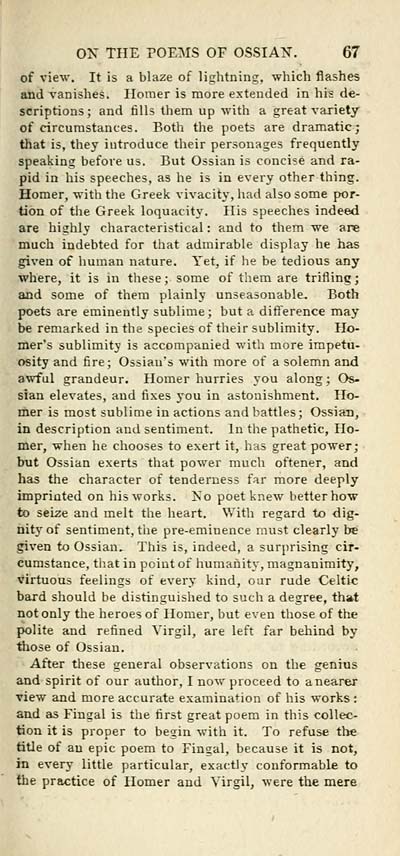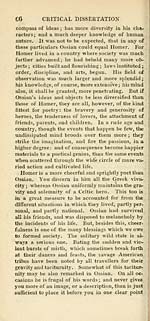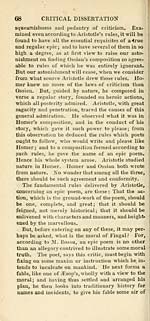Ossian Collection > Poems of Ossian
(115)
Download files
Complete book:
Individual page:
Thumbnail gallery: Grid view | List view

ox THE POEMS OF OSSIAN. 67
of view. It is a blaze of lightning, which flashes
and vanishes. Homer is more extended in his de-
scriptions; and fills them up with a great variety
of circumstances. Both the poets are dramatic;
that is, they introduce their personages frequently
speaking before us. But Ossian is concise and ra-
pid in his speeches, as he is in every other thing.
Homer, with the Greek vivacity, had also some por-
tion of the Greek loquacity. His speeches indeed
are highly characteristical : and to them we are
much indebted for that admirable display he has
given of human nature. Yet, if lie be tedious any
where, it is in these; some of them are trifling;
and some of them plainly unseasonable. Both
poets are eminently sublime; but a difierence may
be remarked in the species of their sublimity. Ho-
mer's sublimity is accompanied with more impetu-
osity and fire; Ossiau"s with more of a solemn and
awful grandeur. Homer hurries you along ; Os-
sian elevates, and fixes you in astonishment. Ho-
mer is most sublime in actions and battles; Ossistn,
in description and sentiment. In the pathetic, Ho-
mer, when he chooses to exert it, has great power;
but Ossian exerts that power much oftener, and
has the character of tenderness far more deeply
imprinted on his works. Ko poet knew better how
to seize and melt the lieart. With regard to dig-
nity of sentiment, tiie pre-eminence must clearly be
given to Ossian, This is, indeed, a surprising cir-
cumstance, that in point of humanity, magnanimity,
virtuous feelings of every kind, our rude Celtic
bard should be distinguished to such a degree, that
not only the heroes of Homer, but even those of the
polite and refined Virgil, are left far behind by
those of Ossian.
After these general observations on the genius
and spirit of our author, I now proceed to a nearer
view and more accurate examination of his works :
and as Fingal is the first great poem in this collec-
tion it is proper to begin with it. To refuse the
title of an epic poem to Fingal, because it is not,
in every little particular, exactly conformable to
the practice of Homer and Virgil, were the mere
of view. It is a blaze of lightning, which flashes
and vanishes. Homer is more extended in his de-
scriptions; and fills them up with a great variety
of circumstances. Both the poets are dramatic;
that is, they introduce their personages frequently
speaking before us. But Ossian is concise and ra-
pid in his speeches, as he is in every other thing.
Homer, with the Greek vivacity, had also some por-
tion of the Greek loquacity. His speeches indeed
are highly characteristical : and to them we are
much indebted for that admirable display he has
given of human nature. Yet, if lie be tedious any
where, it is in these; some of them are trifling;
and some of them plainly unseasonable. Both
poets are eminently sublime; but a difierence may
be remarked in the species of their sublimity. Ho-
mer's sublimity is accompanied with more impetu-
osity and fire; Ossiau"s with more of a solemn and
awful grandeur. Homer hurries you along ; Os-
sian elevates, and fixes you in astonishment. Ho-
mer is most sublime in actions and battles; Ossistn,
in description and sentiment. In the pathetic, Ho-
mer, when he chooses to exert it, has great power;
but Ossian exerts that power much oftener, and
has the character of tenderness far more deeply
imprinted on his works. Ko poet knew better how
to seize and melt the lieart. With regard to dig-
nity of sentiment, tiie pre-eminence must clearly be
given to Ossian, This is, indeed, a surprising cir-
cumstance, that in point of humanity, magnanimity,
virtuous feelings of every kind, our rude Celtic
bard should be distinguished to such a degree, that
not only the heroes of Homer, but even those of the
polite and refined Virgil, are left far behind by
those of Ossian.
After these general observations on the genius
and spirit of our author, I now proceed to a nearer
view and more accurate examination of his works :
and as Fingal is the first great poem in this collec-
tion it is proper to begin with it. To refuse the
title of an epic poem to Fingal, because it is not,
in every little particular, exactly conformable to
the practice of Homer and Virgil, were the mere
Set display mode to: Large image | Transcription
Images and transcriptions on this page, including medium image downloads, may be used under the Creative Commons Attribution 4.0 International Licence unless otherwise stated. ![]()
| Early Gaelic Book Collections > Ossian Collection > Poems of Ossian > (115) |
|---|
| Permanent URL | https://digital.nls.uk/77990218 |
|---|
| Description | Selected books from the Ossian Collection of 327 volumes, originally assembled by J. Norman Methven of Perth. Different editions and translations of James MacPherson's epic poem 'Ossian', some with a map of the 'Kingdom of Connor'. Also secondary material relating to Ossianic poetry and the Ossian controversy. |
|---|
| Description | Selected items from five 'Special and Named Printed Collections'. Includes books in Gaelic and other Celtic languages, works about the Gaels, their languages, literature, culture and history. |
|---|

